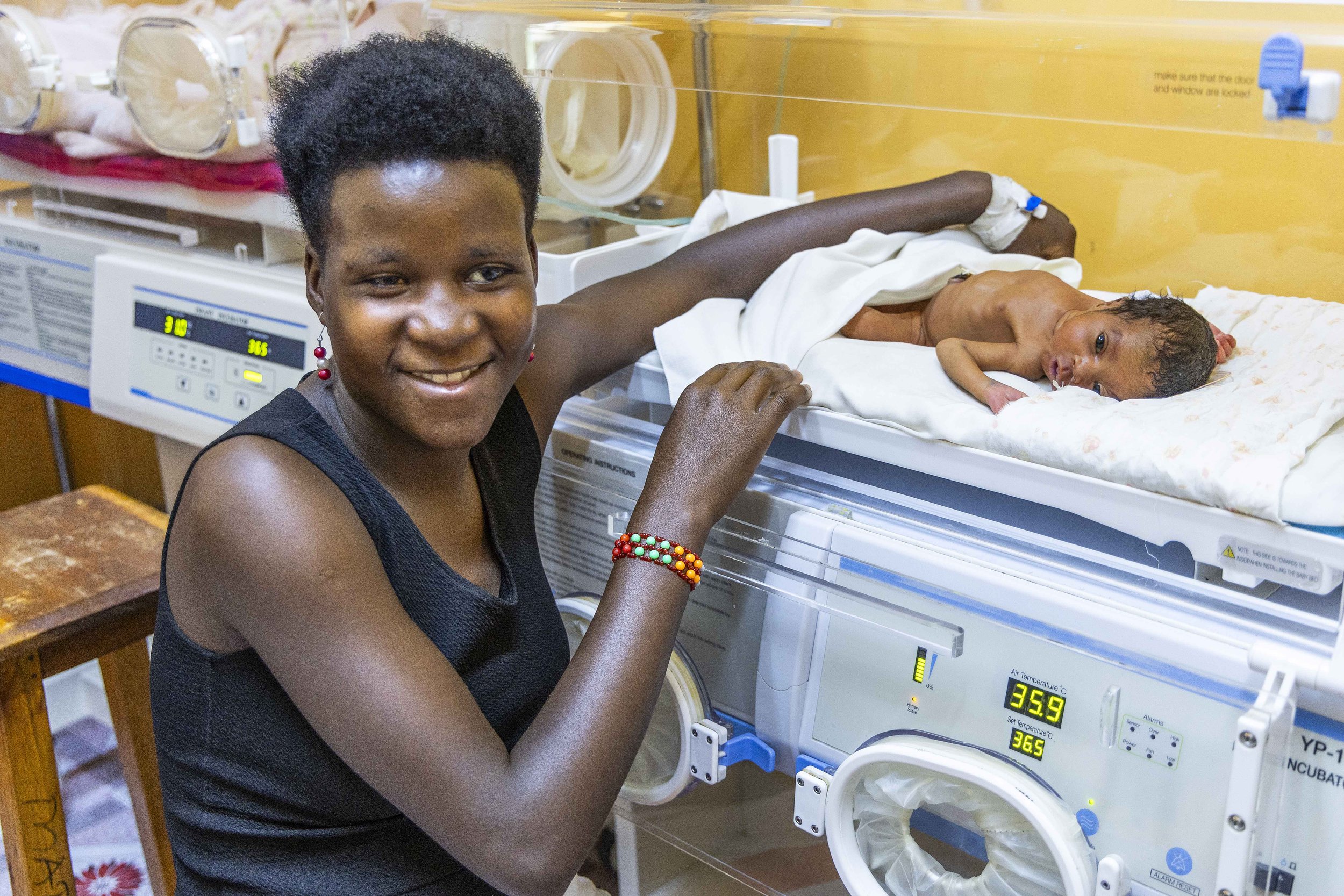Pauline’s journey of hope and resilience (World Prematurity Day)
At 20, Pauline had imagined the arrival of her first child to be a joyful occasion filled with excitement, but nothing could have prepared her for the rollercoaster of emotions that began when she went into labor.
It started with sharp pains, and Pauline’s mother rushed her to Kibale Health Center in Rakai District, hoping for a smooth delivery. But when the midwife examined her, a feeling of unease quickly spread. Pauline’s baby was in a breech position, meaning the baby was positioned feet-first, not head-first, which made vaginal delivery dangerous. The midwife’s voice was calm but serious as she explained that Pauline would need to be referred to Rakai General Hospital, a larger facility with the necessary equipment for such cases.
Pauline’s heart raced with fear as her mother helped her into the car, not knowing what to expect. Her mind swirled with worry, especially as a first-time mother. What if something went wrong? What if her baby wasn’t going to be okay?
When they arrived at Rakai General Hospital, the medical team quickly took charge. Pauline was immediately examined and prepared for a cesarean section. She was both terrified and relieved the thought of surgery scared her, but it was the only option for her baby’s safety.
The procedure went smoothly, and soon, the doctors held up a tiny, fragile baby girl—a premature baby, born far too soon. Pauline’s heart swelled with love, but anxiety gripped her. Her baby was so small, no bigger than the palm of her hand. She couldn’t help but worry, her mind filled with questions:
Would she survive? Would she grow strong enough to come home?
As the days passed, Pauline struggled with fear and exhaustion. The doctors and nurses did everything they could to reassure her, but she still felt uncertain. Her baby, though alive, was extremely fragile. She had to be placed in an incubator to help regulate her body temperature and to receive specialized care. Pauline learned that her baby would need extra attention for a while, and her heart ached at the thought of her tiny girl fighting to survive.
In the quiet of the hospital, during long hours spent beside her baby’s incubator, Pauline was introduced to Kangaroo Mother Care (KMC), a method that involved skin-to-skin contact between mother and baby to help regulate the baby’s temperature, stabilize their heart rate, and provide emotional bonding. The nurses also taught Pauline how to feed her baby through a feeding tube, as her little one was too small and weak to breastfeed on her own. Despite her initial fear and uncertainty, Pauline did her best to follow the nurses' guidance, holding her baby close and helping her through each tiny feeding.
It was through the support of Rakai General Hospital, that Pauline began to see a glimmer of hope. FREo2, BAMA Foundation partner organization, had provided critical resources to the hospital, including incubators and free oxygen, which were essential in helping Pauline’s baby grow stronger.
For the next month, Pauline stayed at Rakai General Hospital, watching her baby slowly improve. Each day was a small victory her baby was gaining weight, her health was improving, and Pauline’s confidence as a mother grew. There were days when it felt like the progress was slow, but she was learning to be patient, trusting that her baby was getting the care she needed.
Today is World Prematurity Day, observed annually on November 17 to raise “global awareness of the challenges for women and babies associated with preterm birth, and celebrate the lives of preterm infants” (UNICEF).
“I will never forget the support I received".”
Pauline takes a moment to reflect on the long, difficult journey she has been on. It has not been easy. There have been sleepless nights, moments of fear, and times when the future felt uncertain. But when she looks at her baby now growing stronger every day Pauline feels a deep sense of gratitude. The pain of those early days has begun to fade, replaced by the joy of seeing her child thrive.
“I will never forget the support I received,” Pauline says, her voice full of emotion. “From the doctors and nurses who never gave up on my baby, to BAMA Foundation and FREo2 for equipping the NICU with the tools that saved my daughter’s life. I can never thank them enough.”
As she prepares to mark Prematurity Day, Pauline stands alongside other families who have navigated similar journeys. Together, they reflect on the millions of babies born too soon, and the courage of the mothers, fathers, and families who fight every day to help their babies grow strong.
For Pauline, the journey is far from over. She has many challenges ahead, but she knows she is not alone. The support from health professionals, programs like BAMA, and the strength of her love for her baby continue to guide her through.
Her baby, once so fragile and small, is now thriving. With each passing day, Pauline is reminded of the resilience of her little one and her own.
Her daughter, who once fought so hard to survive, will continue to grow. And so will Pauline - one day, one step at a time.


